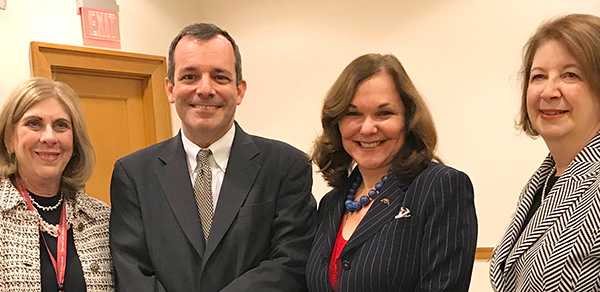Why are women lawyers leaving the profession mid-career? ABA initiative takes up issue

Roberta Liebenberg (far left) and Stephanie Scharf (far right), co-chairs of the ABA Initiative on Achieving Long-Term Careers for Women in Law, flank Harvard Law School Dean John Manning and ABA President Hilarie Bass at the opening reception of the initiative’s summit on Nov. 7. (Image provided by the ABA.)
An ABA initiative to study why women are leaving the profession mid-career kicked off last week with a summit at Harvard Law School.
“We know far too many women lawyers are leaving the profession every year from law school on,” says ABA President Hilarie Bass, who has made this issue one of the major focuses for her year in office. “What we have recently learned is that many of them are leaving in what should be the prime of their careers.
“This is a huge loss of talent and expertise to the legal profession and to our justice system that we cannot afford.”
The ABA National Summit on Achieving Long-Term Careers for Women in Law marked the official launch of the initiative, with 160 lawyers attending the two-day, invitation-only event on Nov. 7 and 8. Sen. Elizabeth Warren, D-Mass., recorded welcoming remarks for the attendees. In addition to group discussions and a viewing of the documentary Balancing the Scales, two plenary sessions were held: “Why Experienced Women Lawyers Leave and Why We Should Care” and “Fixing the Problem: What Works.”
Three theories proposed for why there is an exodus of women lawyers were work/life balance, unconscious bias and the pay gap, according to ABA media relations. But the larger intent of the initiative is to conduct empirical research to test those theories and develop data-driven strategies to address the problem. The members of the initiative—which is co-sponsored by the ABA Commission on Women in the Profession, the Center for Women in Law, the ABA Section of Litigation and a number of law firms and financial firms—intend to have the preliminary results of the research studies available at a second summit planned for the summer, with the completed research to follow.
“The summit was a great start,” says Bass. “We look forward to collecting the data we need to get more specific answers as to why this is happening so that we can develop real and practical solutions.”
Write a letter to the editor, share a story tip or update, or report an error.


